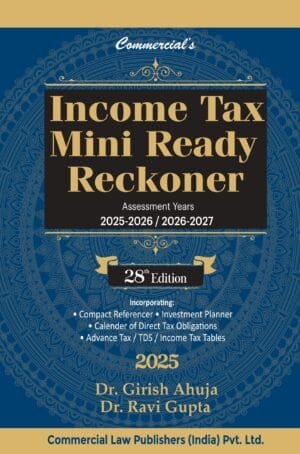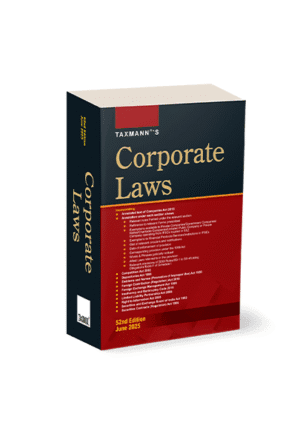No products in the cart.
Return To ShopTaxmann GST Input Tax Credit By V S Datey Edition 2025
Taxmann GST Input Tax Credit By V S Datey Edition 2025
Description
GST Input Tax Credit has long been recognised as a comprehensive and authoritative treatise on the nuances of Input Tax Credit (ITC) under the Goods and Services Tax regime. It has been updated to reflect all changes made by the Finance Act 2025. This Edition is an indispensable resource for readers seeking clarity, insight, and practical know-how on ITC mechanisms in GST. This book meticulously covers every stage of the ITC journey—from understanding fundamental concepts of GST to specialised issues like input distribution, blocked credits, refunds, and ITC utilisation. It clarifies complicated legislative provisions through systematically organised chapters, case laws, and regulatory references.
This book is intended for the following audience:
- Tax Professionals & Practitioners – Chartered Accountants, Cost Accountants, Company Secretaries, Advocates, and tax consultants who advise on or deal with compliance, litigation, and advisory in GST
- Businesses & Corporates – Finance, taxation, and accounts teams in micro, small, medium, and large enterprises that regularly interact with Input Tax Credit claims and procedures
- Government Officials & Regulators – Departmental personnel who administer GST laws, review ITC claims, conduct audits, and deal with cross-border transactions
- Any Individual or Entity Dealing with GST – Especially those needing clarity on partial credits, blocked credits, or refunds arising from exports or inverted duty structures
- Academicians & Students – Faculty members, law students, and business students specialising in taxation and looking for in-depth coverage of the ITC framework
The Present Publication is the 15th Edition | 2025, amended by the Finance Act 2025. This book is authored by V.S. Datey with the following noteworthy features:
- [Comprehensive Treatment of ITC] Provides a 360-degree view, starting with the basics of GST, culminating in advanced ITC topics like Input Service Distributor (ISD) and cross-utilisation of credits
- [Updated Content] Reflects the latest statutory changes, clarifications, and notifications, including all amendments introduced by the Finance Act 2025
- [Practical Insights] Illustrations, case laws, and problem-solving examples that show how provisions work in practice
- [Step-by-step Guidance] Each procedure—registration, claiming ITC, reversal scenarios, refunds—is explained in a methodical manner
- [Extensive Appendices] Contains relevant sections from the CGST Act, IGST Act, and CGST Rules; includes clarifications, notifications, and circulars that provide deeper context and easy referencing
- [Easy Reference Tools] A detailed table of contents, exhaustive subject index, and ‘Acronyms in GST’ list to help navigate complex topics quickly
The coverage of the book is as follows:
- GST Overview
- Fundamental structure of GST, types of taxes (CGST, SGST/UTGST, IGST), dual GST framework, and the concept of destination-based taxation
- Highlights of GST Law
- Definitions of goods and services, taxability rules, place of supply, time of supply, valuation, and procedures for registration/invoice generation
- VAT Concept & Application in GST
- Historical background, evolution from VAT to GST, and how credit mechanisms have transitioned to the current GST system
- Detailed ITC Provisions
- Definition of Input Tax
- Conditions to avail ITC and documentary requirements
- Time limits for claiming ITC
- Blocked credits (e.g., motor vehicles, works contract services, personal expenses)
- Partial credit when taxable and exempt supplies co-exist
- ISD (Input Service Distributor)
- Rules and mechanisms for distributing input service credits across different branches or registrations, including recent changes effective from 1-4-2025
- ITC Utilisation
- Understanding Electronic Credit Ledger (ECL) and Electronic Cash Ledger (ECL)
- Sequence of credit utilisation across CGST, SGST/UTGST, IGST, and restrictions imposed by law
- Interest liabilities for delayed payments and wrong availment
- Exports & Imports
- Zero-rated supplies, refunds on exports, LUT/Bond mechanism
- Restrictions on claiming IGST refunds when inputs are procured under concessional rates or exemption schemes
- Special provisions for SEZ units/developers, deemed exports, duty-free shops, high seas sales, and bonded warehouses
- Refund Mechanisms
- Conditions and procedures for refund of unutilised ITC, excess tax, inverted duty structure
- The doctrine of unjust enrichment
- Handling deficiency memos, showing cause notices, and using relevant forms (RFD-01, RFD-06, RFD-07, etc.)
- Each chapter integrates legislative references with administrative guidance, ensuring that the explanation aligns with the law and practical procedures
The structure of the book is as follows:
- Foundational Chapters (Chapters 1 & 2) – Provide a broad overview of GST, definitions, and the legal framework to set the context for ITC
- Transitional & Core ITC Chapters (Chapters 3, 4 & 5) – Dive deep into the specifics of Input Tax Credit, blocked credits, partial credits, and how ITC is impacted when a business engages in both taxable and exempt supplies
- Special Topics (Chapters 6 & 7) – Cover Input Service Distributor (ISD) provisions and the detailed process of utilising ITC for payment of output taxes, including the interplay of different tax heads
- Exports & Imports (Chapter 8) – Explains zero-rated supplies, refund options, and specialised import-export scenarios such as high seas sales, bonded warehouse transactions, and merchant trade
- Refund Procedures (Chapter 9) – Offers a structured approach to claiming refunds, dealing with inverted duty structures, and the correct procedure for obtaining IGST refunds on exports
- Appendices – A robust set of appendices (Sections of CGST & IGST Acts, relevant CGST Rules, clarifications, and circulars) to facilitate cross-referencing and deeper research
- Subject Index & Acronyms – A thorough index and a ready reference for acronyms used in GST law ensures that readers can find topics quickly and understand key terminologies without confusion
About the author
Mr Datey brings a wealth of experience from over two and a half decades in the corporate sector, having held senior positions such as Company Secretary and General Manager (Finance) at prominent listed companies, including Kirloskar Tractors and Taparia Tools, from 1966 to 1993.
In 1993, Mr. Datey transitioned to writing and became a distinguished author in indirect taxes and corporate laws. His publications, all of which are published by Taxmann, cover a range of pertinent topics in these areas.
His works are essential reading material for professional courses, including CA, CS, and ICMA, and serve as valuable resources for professionals in the field and regulatory staff.
| Weight | 0.55 kg |
|---|---|
| Book Author | V S Datey |
| Binding | Paper back |
| Edition | 15th Edition 2025 |
| HSN | 49011010 |
| ISBN | 9789356221376 |
| Language | English |
| Publisher | Taxmann |
Only logged in customers who have purchased this product may leave a review.
Related products
Original price was: ₹1,495.₹1,120Current price is: ₹1,120.






Reviews
There are no reviews yet.